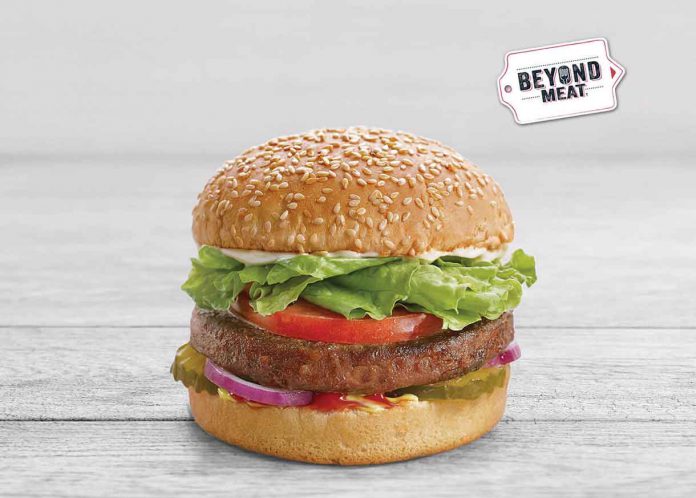Beyond Meat is heading to Canadian grocery stores. It’s the leading edge of a shift in how we consume proteins
By Sylvain Charlebois
Senior Fellow
Atlantic Institute for Market Studies
HALIFAX – It was just a matter of time before Beyond Meat, the California-based company partially owned by Bill Gates and meat giant Tyson Foods, jumped from drive-throughs to grocery store shelves.
Beyond Meat recently announced that its vegan burger will be available at several large Canadian grocers beginning in May, just in time for barbecue season.
How will grocers market these products? They could be right next to the meat version most of us are accustomed to, or at least somewhere close to the meat counter.
And how will Beyond Meat’s price point compare to regular animal protein products?
The introduction of this product could bring some dearly needed top-line growth for desperate grocers who have seen meat counter sales become less than reliable.
Canadians will be able to purchase the plant-based burgers almost everywhere: at Co-op Food Stores, IGA, Loblaws, Fresh Street Market, Longos, Metro, Save-On-Foods, Sobeys and Whole Foods Market.
Beyond Meat’s capacity to supply all these outlets at once is impressive. Rarely in Canada have we seen a supplier orchestrate such a well-co-ordinated, timely market invasion.
This rare oligopolistic endorsement of the product makes the senior leadership at A&W look like geniuses. A&W was the lone company to introduce the product to Canadians a few years ago. Now grocers are drinking the plant-based Kool-Aid all at once.
A&W’s campaign was a success but it brought its share of controversy. The Vancouver-based restaurant chain was criticized as anti-Canadian and anti-meat. Ranchers now love to detest A&W.
Canadians remain quite attached to meat consumption but an increasing number are reconsidering their health priorities. Other drivers of the shift to plant-based protein are animal welfare and environmental stewardship, but health appears to be the most forceful determinant.
But meat supporters have a point. Nutritionally, the case for Beyond Meat may be very strong but it still can’t label itself as a true replacement to the real thing, since the Beyond Meat burger is mostly made of peas and soy. Its texture and the way it reacts to the barbecue don’t replicate meat – at least not yet.
The company aims to be listed on the Dow Jones through an initial public offering worth over US$1.2 billion. That’s an impressive number, considering how marginalized plant-based diets were just a few years ago.
Beyond Meat, a 10-year-old company whose products are available in more than 27,000 food service outlets worldwide, has taken the world by storm. It has a decent product to replace what most omnivores have enjoyed for years, without the cholesterol and guilt.
The company will soon have the infrastructure, cash and knowledge to channel a different source of protein into the world.
It also intends to be more transparent than other companies as it becomes publicly-traded. This is a good strategy, given how the meat industry has been criticized over the years for not being transparent enough. Beyond Meat needs just one recall to kill its momentum. A more open enterprise, though, will bring less suspicion.
So why isn’t Beyond Meat Canadian?
It’s an American product, fostered and propelled by American entrepreneurial spirits – very bright spirits, albeit, but American nonetheless.
Canadian thinking has suppressed any chance for a company to come up with a project like this. There are glimmers of hope, however, as startups are erupting all over the place and will bring a proper dosage of innovation, in due course.
What will help these companies is how the plant-based market will evolve and mature.
Not all vegetable proteins are created equal. Consumers who look to reduce their meat consumption are often concerned they won’t get enough protein.
So Canadian operations – even perhaps Maple Leaf Foods, which just announced a new meatless plant to be built in Indiana – can capitalize on the hyper-segmentation of the plant-based narrative over time.
For a while, though, Beyond Meat will own this space, along with firms like Impossible Foods.
Certainly Beyond Meat has its flaws, such as containing soy protein isolates, about which there are health concerns according to a recent Harvard University study.
Ultimately, however, opportunities will present themselves for Canadian companies. But they need to be ready.
Dr. Sylvain Charlebois is senior director of the agri-food analytics lab and a professor in food distribution and policy at at Dalhousie University, and a senior fellow with the Atlantic Institute for Market Studies.



